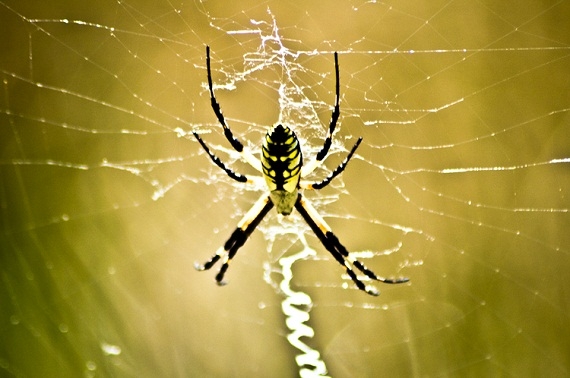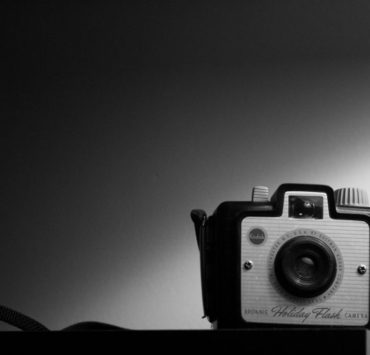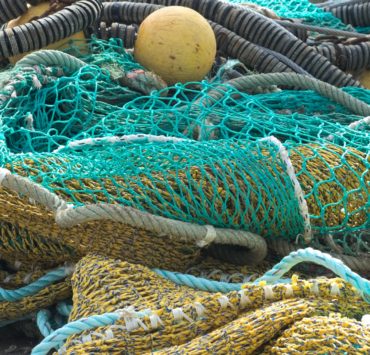
A woman reclined in a yellow Adirondack chair with a back like a tongue depressor, watching the sun go down over the Vermont mountains. Summer was almost done. She looked out across the fields washed in orange light and saw herself in the third person, looking out across the fields washed in orange light. She tried to think of a way to describe the sound of the insects. The writer approached her from the side. She spotted him in her periphery and straightened her posture. Her heart quickened. She had been willing this moment, writing it out in her mind already, so it didn’t come as a surprise when he asked her if she’d seen the creek.
She tried to think of a witty way to say no.
–No.
–Let’s go, kiddo, he said, handing her a peach.
She bit into the fruit. It was mealy but because she liked the idea of the writer watching her eat it she pretended it was ripe. She wondered with sweet unease if her mouth would taste of peaches, if he had been with a black woman before, if she would appear in one of his stories.
They were at a writing conference in a former ski lodge. Each day was apportioned into a rigid schedule of workshops and readings and master classes on craft. In attendance were famous writers, less famous writers and people who aspired to be writers – people who had paid handsomely to be in the midst of writers. These people wanted to be published with a sickening desperation, and sometimes, when he was drunk enough in the evenings before the fieldstone fireplace in the Barn, the writer told them what he really thought of their work. It was kinder to be cruel, of course, but it wasn’t the kindness he enjoyed.
Oh to be bad! To be devilishly bad! When he was a boy he wanted to be a boxer, a bankrobber, a bullfighter. Later he wanted to be Hemingway. But now he was fifty and fat in the middle – midlist, midlife. This young woman was half his age and the only black woman there. He noticed her. She had read all of his novels, even the ones that were painfully dated and out of print. She had hunted out his titles in dusty remainder bins. She wanted to be a writer. Not a black writer, but a writer. Not a female writer, but a writer. He told her he understood; he thought her writing was very, very good.
They struck out for the woods across a shaggy field of wasting hay. The hay was blonde and damp and clung to their shoes. He lamented that it would not go to feed any animals.
–So this field was plowed for beauty? she asked.
–Yes, he scoffed. –For the view of the sunset it affords the writers.
–The cicadas sound like a hundred and six tin wind-up toys going all at once, she said.
–You’re right, he smiled. –You’re exactly right.
They approached the motionless forest, each of them seeing the scene from behind, framed at a great distance. The sunset bled across the top of the picture. They saw themselves as characters about to do something dangerous, but the plot was the writer’s design. At the tree line, his voice deepened.
–Hey, beautiful, he said.
She became beautiful. He had that much power. She thought he did, so he did. He touched her cheek. She smiled.
–‘This is the forest primeval’, he said.
Hand in hand, they descended the cool dark trail.
She noticed the lichen, the various mosses, and the white fungi sprouting through the rotting leaves of the forest floor. She noticed the trees: maple, birch, ash. She noticed the tracks of a fox in the mud. She noticed the writer’s gold wedding band.
–‘Two roads diverged in a yellow wood,’ she said, though there was no fork in the path they were on. It led only to the water where it stopped.
At the creek, the dying sun was reflecting itself, glinting itself over rocks and dappling through the branches. The creek was clear and swollen with the summer rains. He pulled her to his chest there by the waterside.
–I can feel your precious heart beating, he lied.
–I can feel yours, she lied.
Oh to be bad! She believed she enjoyed being in the writer’s arms. When he leaned in to kiss her, she did and didn’t want his lips on hers. Her eyes remained open. There was something ridiculous about his face at this perspective. His pores and the gray stubble sticking out of them; the red network of capillaries around his nostrils and his slightly unpleasant breath. She closed her eyes and thought of the author photo on the back flap of his big book – the one that won the Pulitzer, the one about his son with Down syndrome. Still, his tongue was unwelcome in her mouth. Not what she expected. A fish. A slab of meat. Disquieted, she bit his lower lip.
–Can I have my lip back? he joked.
–Can I have my dignity back? she joked.
They were both pleased by this dialogue.
–Can we just sit by the water and not say anything? she asked. She was content to stop at the kiss. The kiss was elicit enough to be good material.
The writer’s knees cracked as he lowered himself onto the creek bed. –Come here, he said. He pulled her into his lap and slowly undid her braid. She stiffened and watched the water. What did his fingers think of her hair? Didn’t he feel her desire to sit in stillness with him? To be still, like a painting? To be silent?
The writer licked her earlobe. He urgently nibbled the back of her neck. She was getting wet, becoming the thing in his arms being kissed. At the same time, she felt entirely detached from the scene. She noticed a box turtle swimming under the surface of the water and had an impulse to smash it with a rock.
The writer cupped her breasts from behind. She noticed a pinecone being carried downstream. The writer pinched her nipples through the cotton of her summer dress.
–Your breathing just changed, he narrated.
Had she quickened her breath to excite him or was she genuinely excited? She didn’t know. Whatever the case, a growing wetness spread between her legs. She pondered this.
–Turn around, he told her.
She obeyed. He pulled her against his groin. She wrapped her legs around his thick middle and hooked her ankles at the base of his spine. She noticed their long, four armed shadow working itself over the exposed roots of a fallen tree. He ground into her and groaned deeply, like a bear might groan. Swiftly, he stood, carrying her up with him, his hands supporting her rear. He rocked her from side to side, to prove her lightness.
–Little girl, the writer said. He buried his face in her chest and for a moment she thought he was crying.
Then his back spasmed. A dying pine creaked in the wind. He put her down.
–Are you alright? she asked.
He put his finger to her lips. –Shhhhhhh, he said.
He slid his right hand under the skirt of her dress and up her inner thigh. He cupped the mound of her crotch as if he owned it.
–You’re dripping, he said.
He snaked his right hand under the elastic of her panties and slowly inserted his first and second fingers. He was skilled at this. He scissor-kicked his fingers and rotated his thumb knuckle over the bud of her clitoris. He did this for a full two minutes, troubling the carpal tunnel syndrome in his wrist. When she moaned and trembled, he fisted her unloosed hair and jerked her head backwards to bare the cords of her long brown throat.
He wanted to watch her face contort when she came. –Come for me, he said, kicking his fingers inside her, faster and faster.
She pretended to, and in pretending halfway did.
A woodpecker castanetted its beak against the trunk of a nearby tree.
–Feel how hard you make me. He grabbed her wrist and placed her hand on his erection.
His penis was smaller than that of other men’s she’d been with. He pushed her hand down his pants to touch that disappointing bulge of flesh. Repulsed, she pulled back. He undid his belt in a hurry and exposed himself. It couldn’t be avoided. She witnessed its violent pink color thrusting from a mass of gray brown hair and knew he expected her to suck it. It was pointing at her, the color of an earthworm after the rain, with one white drop of pre-cum glistening at its tip.
Feeling a little sick, she knelt before the writer. A twig snapped under her knee.
–Say it, he said, withholding it from her mouth. His testicles had given in to gravity. –I want to hear you say it.
He is the cliché of a lecherous man, she thought.
–Say it, he begged.
She did not say anything. She thought, Why should this be a story about a black woman kneeling before a white man in a muddy summer dress?
It was cold for August. His penis began to shrink into itself. She watched it become a snail.
–If you won’t say it, I will, he said, gripping her shoulders. –I love you, he lied.
It was a terrible word choice and they both knew it. The young woman pitied him now. She was outside her body, participating in the scene, but not in the first person. She wasn’t really there, except that there was a speck of something in her eye. A fleck of dust. She tugged at her eyelid.
He tucked away his penis. It had gone soft.
On the way back she held her elbows. She studied his back, in front of her. How many of his students had he brought into these woods?
–What kind of animal would you be? she asked, a little meanly. –A wolf?
–An eagle, he spat.
Yes, she thought. An eagle. That is exactly the kind of vision you need to be a writer. It occurred to her that she had walked into some sort of story about the writer’s fear of getting old.
He steered her to a yellow cottage, one in a row of quaint yellow cottages. Two aspiring writers swung in a hammock, drinking bourbon from the bottle and examining the porch slats with great attention, as if to make sure they were straight.
–Do you know how ridiculous you look? the writer asked them.
–Come see, they slurred. –The spiders are being born!
The sun’s last light played off a cobweb insinuated in the porch railing. Spider hatchlings glinted on the strands of the web, each of them tiny and translucent, with all eight legs perfectly formed. The young woman lowered her face in front of the web. It formed a lace curtain between her and the world she used to inhabit. Something had shifted. Someone on the other side would judge what she had done in the woods as bad. She could smell her own musky metal odor. It did not please or displease her. She noticed it, was all.
–Come, said the writer, pulling her to his room on the first floor.
One of the aspiring writers pronounced the word slut under her breath, but with perfect diction.
The writer carried the young woman over the threshold like a bride. –I’m not finished with you.
His bed was badly made. The untucked sheet hung at a diagonal beneath the light blue blanket. A cardigan hung limp on one of the bedposts. She noticed the geometry of little rosebuds on the wallpaper. She noticed the writer’s reading glasses on the bedside table next to a half eaten roll of antacid tablets, and that the window shade was not completely drawn.
A writer might easily spy him kissing her. She sensed he liked this and she wondered if she liked it too. Here was her chance to excuse herself from the seduction and simply leave. She could have said no. Instead she imagined the picture the two of them made on the other side of the window frame. Better to be a slut than to be boring, she thought. Better to be honest than to lie.
–Why did you choose me? she asked, re-braiding her hair.
–Because I like the way you see, he answered.
–And because you like the way I look.
–Yes.
–Because I’m black.
He traced her eyebrows with his thumbs. –Maybe, he admitted.
She put her palm on his chest. –Because I’m black.
The writer fingered her full lips. –Yes, he whispered.
–Am I really a good writer? she asked.
–You really are.
She lay down on the bed then, lifted her dress and told him to kiss her.
He noticed her musky odor. She smelled like the mason jar of filthy pennies he’d kept beneath his bed as a boy in Duluth, he thought. He catalogued this sentence in his mind as he kissed her inner thighs.
She closed her eyes and saw the spider. It was imprinted in her memory because of the thing she had done in the woods with the writer, and because of what she was about to do. The young woman would remember the spider’s swollen abdomen, the way she hung face downward in the complicated architecture of her web, and the bands, like a tigers’, striping her elegant legs.
The dinner bell clanged outside the dining room at the Bread Loaf Inn.
She put her hand in the writer’s thinning hair. –What kind of spider was that? she asked. –Out on the porch?
He looked up at her and said, –An orb weaver.
Then he rose to stand between the V of her legs and pulled out his erection for the second time. It couldn’t be ignored. Just as a gun on the stage of a play must go off before the curtain closes, the woman knew she must put him in her mouth and satisfy his need to be adored. This need was not any more pitiful or less human than her own. She sighed and got on the floor.
The woman watched her reflection sucking the writer in the cloudy mirror above the antique dresser, his hands circling the stem of her neck. This is a story about an orb weaver, she thought. I am going to be a great writer.
–Do you want me to cum, baby? he asked. He had heard that somewhere, he had said it before. He liked to say it. It worked for him.
She nodded, working her tongue over the shaft of his cock.
He closed his eyes. –Do you want to drink my cum? he asked. He pushed against her soft palette, her molars, her uvula.
To stop herself from choking, she spoke to herself in the second person:
–Writer! Don’t let the ‘I’ get in the way of your seeing. Your task is only this: open your eyes until you forget you have a throat. You are not you. You are an eagle writing the wind. What do you see? Down by the creek, the fox is washing his face. Out in the field of wasting hay the pit of the peach you ate is already reentering the earth. Who you were when you ate the peach doesn’t matter. What you are doing doesn’t matter, whether you want to or not, whether you kissed him or he kissed you, whether or not it is happening at all.
Far more enchanting is the orb weaver, poised like a diadem in the eye of her web, letting her spiderlings balloon away from her on strands of silk to land in the dark vegetation of Frost’s woods.
Originally published in Nerve in 2007 and anthologized in Best African American Fiction, 2009 (Bantam)

Emily Raboteau is the author of The Professor's Daughter and Searching for Zion, winner of a 2014 American Book Award and a finalist for the Hurston Wright Award. She is currently Distinguished Faculty in the CUNY Graduate Center's Advanced Research Collaborative, where she's completing her third book.







